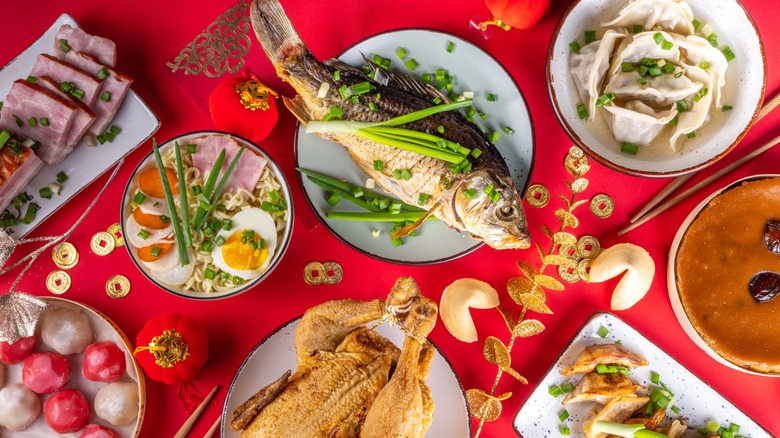100 Chinese Food/Drink Words And Phrases
Chinese food is deep-rooted in symbolic traditions. Long noodles represent a long life, for example, while dumplings shaped like gold nuggets stand for prosperity and fortune.
Before you head over to your favorite Chinese restaurant to celebrate with American-Chinese dishes like Moo Goo Gai Pan or General Tso's Chicken (tasty as they are), try your hand at these Chinese food and drink phrases. Expand your culinary range, and ask your server what's good to eat — you just may be surprised. For those looking to travel to China, this list should be particularly useful. The variations in every region are mind-blowing, and should definitely be sampled. Keep this list handy as you travel along and you should have no problem ordering a fresh soy milk to wash down your mouth-numbingly spicy food, should the craving strike.
*A note on pronunciation: Mandarin Chinese uses four tones. A shift in tone can change a word's meaning entirely, but a system called pinyin transcribes characters into the Roman alphabet to help English speakers pronounce the word they mean (lest you order something very strange).
Drinking
Alcoholic
- Píjiǔ: Beer
- Báijiǔ: Literally means "white liquor"
- Shàoxīngjiǔ: Shaoxing fermented rice wine
- Hóng pútáojiǔ: Red wine
- Bái pútáojiǔ: White wine
- Gānbēi: Cheers!
Non-alcoholic
- Guǒzhī: Fruit juice
- Yī píng shuǐ: One bottle of water
- Bīng shuǐ: Ice water (not really something you should order in China)
- Kěkǒukělè or Kělè: Coca-Cola
- Xuěbì: Sprite
- Kāfēi: Coffee
- Dòujiāng: Fresh soymilk
- Niúnǎi: Literally "cow's milk"
Tea (of course)
- Hóngchá: Black tea
- Lǜchá: Green tea
- Mòlìhuāchá: Jasmine tea
- Wūlóngchá: Oolong tea
- Júhuā chá: Chrysanthemum tea
- Nǎichá: Milk tea/bubble tea
Food
For the carnivore
- Ròu: Meat
- Jī ròu: Chicken
- Niúròu: Beef
- Zhū ròu: Pork
- Yáng ròu: Mutton
From the sea
- Hǎixiān: Seafood
- Yú: Fish
- Xiā: Shrimp
- Xiè: Crab
- Lóngxiā: Lobster
Vegetables
- Dòufu: Tofu
- Dòuyá: Bean sprout
- Bōcài: Spinach
- Báicài: Cabbage
- Cōng: Scallion/Onion
- Sǔn: Bamboo shoot
- Mógu: Mushroom
- Xīhóngshì/ Fān qié: Tomato
- Yùmǐ: Corn
- Tǔdòu: Potato
- Qiézi: Eggplant
Menu Mainstays
- Mǐfàn: White rice
- Chǎo fàn: Fried rice
- Jiǎozi: Dumplings
- Húntún: Wonton
- Tāng: Soup
- Bāozi: Stuffed steamed bun
- Mántou: Plain steamed bun
- Chǎomiàn: Fried noodles
- Tāngmiàn: Noodle soup
- Zhōu: Congee/Porridge
- Yóutiáo: Cruller (to accompany Zhōu)
- Jīdàn: Egg
- Cháyè dàn: Tea-soaked egg
- Pídàn: Century-old egg (preserved duck egg)
Good Regional Dishes to Know
- Sìchuān Huǒguō: Sichuan hot pot
- Chāshāo: Cantonese barbeque pork
- Běijīng kǎoyā: Beijing roast duck
- Lánzhōu lāmiàn: Lanzhou hand-pulled noodles
- Xiǎolóng bāo: Shanghai small steamed buns
- Yángròu chuan: Chinese Muslim barbecue mutton skewers
- Dōng pō zhū ròu: Hangzhou braised pork belly
- Hézǐ jiān: Fujian oyster omelet
- Chǎngshā chòu dòufu: Changsha-style stinky tofu
Flavor
- Là: Spicy
- Má là: Numbing spicy
- Suān: Sour
- Xián: Salty
- Tián: Sweet
- Kǔ: Bitter
- Xiān: Similar to "umami"
- Chòu: Smelly or pungent
- Wèidào: Taste/smell
Spices/Seasoning
- Jiàngyóu: Soy sauce
- Cù: Vinegar
- Dàsuàn: Garlic
- Jiāng: Ginger
- Zhīma: Sesame
- Làjiāo: Hot pepper
- Huājiāo: Sichuan peppercorn (literally "flower pepper")
Good To Know
- Chī fàn: To eat (literally "eat rice")
- Zǎocān: Breakfast
- Wǔcān/Wǔfàn: Lunch
- Wǎncān/Wǎnfàn: Dinner
- Diǎnxīn: Dessert
- Cānguǎn: Restaurant
- Gè rén: (Number) of people
- Fúwùyuán: Waiter/waitress
- Do NOT call your waitress Xiǎojiě. While it typically means "Miss," in the service industry it is slang for "prostitute."
- Kuàizi: Chopsticks
- Chā: Fork
- Wǒ chī sù: I am vegetarian.
- Wǒ yào zhège: I would like this one.
- Yǒu shénme hào chī de: What's good to eat?
- Zhè shì shénme: What is this?
- Càidān: Menu
- Diǎn cài: To order
- Duōshǎo qián: How much (does it cost)?
- Hěn hào chī: Delicious
- Zhēn bàng: Awesome

